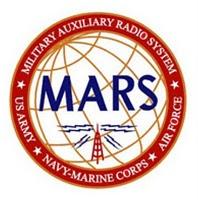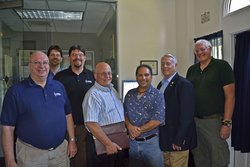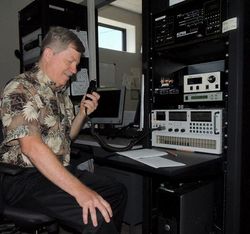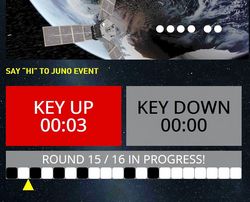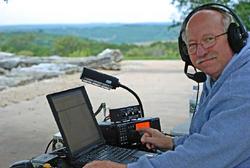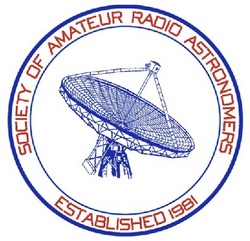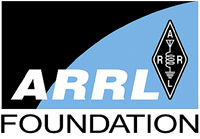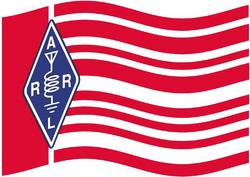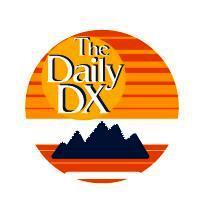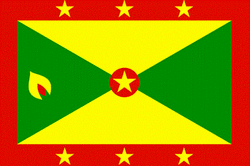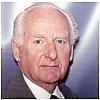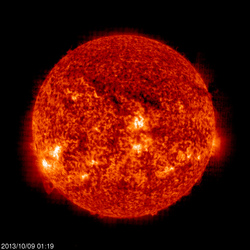 October 10, 2013 John E. Ross, KD8IDJ, Editor
| |||||||||||||||
Public Service: Army MARS Seeks Partnership with ARRL, ARES
Representatives of the US Army Military Auxiliary Radio Service (MARS) met with ARRL staff at League Headquarters October 2 to discuss ways the two organizations might collaborate in emergency response activities. Army MARS Region 1 Director Bob Mims, WA1OEZ, headed the delegation. Mims, who is also manager of the Army MARS National Net, said most of the discussion centered on how ARRL Headquarters and the Amateur Radio Emergency Service (ARES) could interact with MARS during its national-level test of backup communications set for early November, and going forward. "For the exercise the ARRL Headquarters expressed interest in activating their MARS station at W1AW -- AAN1ARL," Mims said. Discussions are still underway regarding the role AAN1ARL and ARES would play in the November exercise. Army MARS has invited Air Force and Navy-Marine Corps MARS to take part in the joint national communication exercise that will measure the auxiliary force's capabilities, should normal communication systems be disrupted throughout North America.
Joining Mims were MARS Southern New England Emergency Operations Officer John Weinland, N1ATB, and MARS members Jon Perelstein, WB2RYV, and Matt Hackman, KB1FUP. The MARS contingent met with ARRL Emergency Preparedness Manager Mike Corey, KI1U, ARRL Emergency Preparedness Assistant Ken Bailey, K1FUG, and W1AW Station Manager Joe Carcia, NJ1Q. Mims relayed to Army MARS Headquarters at Fort Huachuca, Arizona, Corey's suggestion that local ARES nets could provide assistance during the November exercise by generating and relaying messages. Army MARS says the exercise is aimed at demonstrating conventional traffic-handling abilities. The test will run November 3-5, and a joint Army/Air Force/Navy-Marine Corps team responsible to the US Department of Defense for homeland security will monitor the 48 hour exercise. Army MARS Program Manager Paul English, WD8DBY, says that while Army MARS is the lead service in the exercise, it is looking forward to participation from the other MARS services as well as from the Canadian Forces Affiliate Radio System (CFARS). "In order to properly evaluate our ability to provide this coverage," English explained, "there will be a series of messages sent from DOD and the Army MARS Headquarters, Network Enterprise Technology Command (NETCOM), to MARS members requesting various pieces of information such as weather observation reports from airports around the country, requesting local news items of interest from areas around the country, and also requesting information on the status of utilities around the area." The exercise would culminate a year-long series of escalating preparations by Army MARS for responding to complex emergencies -- a natural disaster or terrorist attack -- that might crash or compromise the Internet, telephone, and national news and media networks across the US. ARRL has asked the MARS contingent to provide points of contact at least within each of the FEMA regions or possibly a couple of different contacts in the various MARS groups. Subsequent to the meeting at League Headquarters, ARRL Southwestern Division Vice Director Marty Woll, N6VI, paid a visit on October 8 to Army MARS Headquarters in Fort Huachuca, Arizona. Woll says he enjoyed an extended conversation with Army MARS Chief of Operations David McGinnis, K7UXO. "David was very complimentary of the radio amateurs who work at the station," Woll said, "and he expressed great interest in opportunities for MARS and ARRL to work more closely together."
Woll points out that the MARS HQ station can handle nearly a dozen simultaneous HF links, "and we employed one of them to hold an impromptu 18 MHz contact with W1AW," he added. He arranged the contact via more conventional means -- the telephone -- adding that he and W1AW Station Manager Joe Carcia, NJ1Q, enjoyed a brief conversation on the air as the staff looked on. Woll said McGinnis expressed interest in possibly arranging such contacts on a periodic basis and said he'd like to better acquaint the amateur community with the role and functions of Army MARS. McGinnis recounted that he and Woll discussed conducting regular checks with W1AW, using both Amateur Radio and MARS circuits, and quarterly drills on both circuits. Woll, who's also an ARES assistant District Emergency Coordinator, was in Arizona to speak to the Cochise Amateur Radio Association (CARA). MARS is a US Department of Defense-sponsored program with Army, Navy, and Air Force branches. The program consists of Amateur Radio operators who are interested backing up the US Department of Defense's communication requirements when normal channels are disrupted in disasters or emergencies. Events: Hams Collaborate to Greet Juno Spacecraft on Flyby; Results Are Pending
Radio amateurs around the globe greeted NASA's Juno spacecraft October 9 as it looped past Earth for a gravity-assisted boost on its way to Jupiter. Participants were invited to spread out across 10 meters to transmit "HI" in very slow speed CW (1/25 WPM), sending 30 second dits punctuated by 30 second spaces and 90 seconds between the two characters. The experiment involved 16 identical rounds or cycles and ran a bit longer than 2-1/2 hours all told (1800 to 2040 UTC). The object of the experiment was to see if Juno's onboard "Waves" experiment would be able to detect the collective RF. One possible glitch was that the spacecraft's systems went into "safe mode" at some point. University of Iowa researcher and Waves Principal Engineer Don Kirchner, KDØL, believes the unexplained switchover will not prove to be a problem for the "Say 'HI' to Juno" experiment. "Safe mode entry was late enough that we likely have data taken from the event," Kirchner told ARRL. "[Project managers] are carefully working through their standard procedures, which take priority over downlinking the science telemetry that should be stored on board. I am still hopeful that we will have enough data to determine whether or not our instrument was able detect amateur signals." Among stations participating were operators at the Virginia Tech Amateur Radio Club's K4KDJ, who posted video of their activity on YouTube. Whatever the outcome, Kirchner said, he and the Juno team would like to thank the operators who took part in the experiment. He said reports came in from all over the world. Anyone who took part can request a QSL card that acknowledges their help. "Indications are that we had very large and enthusiastic participation," he added. At the time of the experiment the Juno spacecraft was within 50,000 kilometers from Earth, and the Waves team determined that would be the best opportunity for the wide-band receiver to detect Amateur Radio signals. Spreading out participants on a wide range of 10 meter frequencies was intended to improve the chance of the Waves instrument's hearing the ham signals. The detector has a bandwidth of 1 MHz.
"The natural signals we expect to measure at Jupiter will consist of a large number of discrete tones," a pre-experiment announcement explained, "so spreading the signals out in this manner is a good approximation to the signals we expect to detect. But at Jupiter, we don't expect to be able to decode CW in our telemetry!" Despite the government shutdown two websites were available to guide participants when to key down and when to stop transmitting. Numerous operators were monitored who, apparently not having read or fully understood the instructions, transmitted "HI" and their call signs at normal CW speeds. The very slow speed CW was necessary because the Waves instrument samples the spectrum just once per second. As the website explained, "By spreading the signal out in time, we can average to reduce the noise level. In addition, the spacecraft spins at 2 RPM, so a 30 second 'dit' time gives us a full spin to see if there is any spin modulation." Organizers were actually hoping for poor conditions on 10 meters, so that signals from Earth would pass through the ionosphere for the most part, allowing the spacecraft a better chance of detecting them. The Jet Propulsion Laboratory's Say "HI" to Juno web page and the Southwest Research Institute's Say "HI" to Juno Event website will report the results of the experiment. Events: Government Shutdown Prompts Changes in National Wildlife Refuge Week Special Event Due to the partial US Government shutdown, the National Wildlife Refuge Week Amateur Radio special event scheduled to run October 12 until October 20 has suspended rules that confine NWR Week stations operations within the boundaries of national wildlife refuges and wildlife areas. The government shutdown has closed some, if not all, federal wildlife refuges, so stations may operate from any location for this year's event. Although rules 1, 2, 3, and 4 have been suspended; all others remain in effect.
"The action was taken to allow participants to begin planning now for alternative locations, if they decide it's necessary, since it is unclear how long the government shutdown will last," said 2013 NWR Week special event coordinator Brad Farrell, K4RT. "While we are disappointed that refuges have closed, we believe that the suspension may encourage individual hams and clubs who wish to help celebrate National Wildlife Refuge Week to operate from their home or club stations," Farrell said. "During QSOs, hams may share information about the features of a refuge or wildlife area in their state or province as a way to mark National Wildlife Refuge Week." The goal for participants is to combine their communication skills with their enjoyment of the outdoors to help others learn about the National Wildlife Refuge System. Contact the NWR Week Amateur Radio coordinator for more information. Events: Society of Amateur Radio Astronomers Issues Call for Conference Papers
The Society of Amateur Radio Astronomers (SARA) is seeking papers for its 2014 Western Regional Conference. The event takes place March 22-23, 2014, in Bishop, California, and at the Owens Valley Radio Observatory. The first day of the conference will be spent at Caltech's Owens Valley Radio Observatory, with presentations by OVRO staff and SARA members and supporters followed by a tour of the Combined Array for Research in Millimeter-Wave Astronomy (CARMA) in the nearby mountains. The conference will adjourn the next day to Bishop, for presentations by SARA members and supporters. Papers are welcome on subjects directly related to radio astronomy, including hardware, software, education and tutorials, research strategies, observations, space weather, geomagnetism and solar radio, data collection, and philosophy. SARA members and supporters wishing to present a paper should e-mail a letter of intent to the conference coordinator, including a proposed title and abstract no later than December 31, 2013. Include full name, affiliation, postal address, and e-mail address, and indicate whether you are willing to attend the conference to present your paper. Formal printed Proceedings will be published for this conference, and all presentations can be made available on CD. Additional information is on the SARA website. Your League: The ARRL Foundation Invites Scholarship Applications
The ARRL Foundation is currently accepting applications from eligible young radio amateurs pursuing higher education. More than 80 scholarships ranging from $500 to $5,000 are awarded annually. Additionally, one applicant is selected for the prestigious William R. Goldfarb Scholarship, awarded to a high school senior pursuing a degree in business, computers, medical, nursing, engineering or science. The recipient of the Goldfarb Scholarship is eligible to receive funding throughout four academic years to earn a bachelor's degree. All applicants must be active radio amateurs and must complete and submit the online application. "The scholarship process, though rigorous, distributes more than $150,000 to deserving young people, who are actively involved in Amateur Radio and preparing for their future. Individuals and clubs, who support these scholarships, are excited to be able to assist with the financial burden of advanced education," says ARRL Foundation Secretary Mary Hobart, K1MMH. "Both the ARRL Foundation and donors know that we are helping the next generation and the future of Amateur Radio." In 2013, the ARRL Foundation awarded 82 scholarships in addition to the Goldfarb Scholarship. Students planning to apply for 2014 awards should read scholarship descriptions carefully and apply only for those scholarships for which they are eligible (some scholarships have geographic criteria or other requirements). In addition to completing the online application, applicants must submit a PDF of their academic transcript from their most recently completed school year. Goldfarb Scholarship applicants also must submit a copy of their completed Free Application for Federal Student Aid (FAFSA). Applications are due January 31, 2014, by 11:59 PM Eastern Time. Awards winners typically are notified in mid-May by USPS mail and e-mail. Established in 1973 as an independent and separate IRS 501(c)(3) organization, the ARRL Foundation manages grant and scholarship programs to support the Amateur Radio community. All grants and scholarships are funded entirely by the generous contributions of radio amateurs, clubs and friends. Individuals, groups or clubs wishing to establish an ARRL Foundation Scholarship Fund should visit the ARRL Foundation web page. For more information about ARRL Foundation scholarships, e-mail the ARRL Foundation or call 860-594-0348. Your League: Nominations Due December 31 for 2013 ARRL International Humanitarian Award
Nominations are due December 31 for the 2013 ARRL International Humanitarian Award. This award is conferred upon a radio amateur or amateurs who demonstrate devotion to human welfare, peace and international understanding through Amateur Radio. The League established the annual prize to recognize Amateur Radio operators who have used ham radio to provide extraordinary service to others in times of crisis or disaster. A committee appointed by the League president is now accepting nominations from Amateur Radio, governmental or other organizations that have benefited from extraordinary service rendered by an Amateur Radio operator or group. Amateur Radio is one of the few telecommunication services that allow people throughout the world from all walks of life to meet and talk with each other, thereby spreading goodwill across political boundaries. The ARRL International Humanitarian Award recognizes Amateur Radio's unique role in international communication and the assistance amateurs regularly provide to people in need. Nominations should include a summary of the nominee's actions that qualify the individual (or individuals) for this award, plus verifying statements from at least two people having first-hand knowledge of the events warranting the nomination. These statements may be from an official of a group (for example, the American Red Cross, The Salvation Army, a local or state emergency management official) that benefited from the nominee's particular Amateur Radio contribution. Nominations should include the names and addresses of all references. All nominations and supporting materials for the 2013 ARRL International Humanitarian Award must be submitted in writing in English to ARRL International Humanitarian Award, 225 Main St, Newington, CT 06111 USA. The winner of the ARRL International Humanitarian Award receives an engraved plaque and a profile in QST and other ARRL venues. On the Air: Pacific, Asia DX Operations Announced
The Daily DX reports several opportunities to work some rare and semi-rare DXCC entities in Southeast Asia and the South Pacific this fall. This is not a definitive list, and details may change.
On the Air: Informal Grenada Commemorative Operations Set
It was 30 years ago this month, after an army-backed pro-Marxist coup degenerated into civil disorder on the Caribbean Island nation of Grenada, that the US military spearheaded an intervention known as "Operation Urgent Fury." As The Daily DX reports, Mark Barettella, then KA2ORK and a student at the Saint George's Medical School, got on the air /J37, becoming a source of news and vital information regarding the US and Caribbean Regional Security System "intervention and rescue of US medical students in Grenada" on October 25, 1983. Now N2MD, Barettella is heading back for the 30th anniversary of the event and will operate as J3/N2MD. Joining him for the anniversary will be retired US Navy officer Arnal Cook, N9ACC (ex-N9AKX), who was involved in the 1983 mission. He will be active as J3/N9ACC. The holiday-style operation will involve both fixed and mobile stations, 80 through 6 meters SSB, mostly during their evenings. QSL only via LoTW. -- The Daily DX Awards: Window Opens for 2014 Dayton Hamvention Award Nominations Dayton Hamvention® is soliciting nominations for its 2014 awards for Amateur of the Year, Special Achievement, Technical Excellence, and Club of the Year. All Amateur Radio operators are eligible. Nominations must be received by January 17, 2014, to be considered. Winners will be recognized at the 2014 Dayton Hamvention®, May 16, 17 and 18.
The Dayton Hamvention Awards Committee makes the final decision on all awards, based in part upon the information it receives, not on the number of nominations. Documentation that informs the Awards Committee of a nominee's accomplishments may include magazine articles, newsletters, newspaper clippings, and even videos (these materials become the property of Hamvention and will not be returned). Additional details on these awards and a nomination form are available on the Dayton Hamvention website. E-mail or mail nominations to Dayton Hamvention Awards, PO Box 1446, Dayton, OH 45401-1446. -- Dayton Hamvention ®, c/o Henry Ruminski, W8HJR People: Tibet Radio Operator, Diplomat Robert W. Ford, ex-AC4RF, SK Robert W. Ford, who operated from Tibet as AC4RF from 1948 to 1950, died September 20 in London. He was 90. His fascinating autobiography, Wind Between the Worlds, published in 1957 and available as a free Internet Archive download, describes his time and travails in Tibet and how his radio work nearly cost him his life.
As Ford explains, he first came to Tibet "by accident" to relieve the radio officer at the British Mission in Lhasa. He returned later as a member of the Tibetan government to establish Radio Lhasa. He also tells of how he kept in touch with his parents in England via ham radio. His stay in Tibet coincided with threats from China to liberate Tibet "from American and British imperialism" and the ultimate Chinese invasion of the Himalayan nation. Ford eventually was imprisoned by the Chinese in 1950, interrogated at length and feared for his life. He was tried for "radio espionage" and spent 5 years in jail before being released. He later became a member of the British Diplomatic Service, serving in various postings before retiring in 1987. He was awarded Commander of the Order of the British Empire. Last spring Ford was given the International Campaign for Tibet's Light of Truth Award by the Dalai Lama. Solar Update
Solar Sage Tad "Let the Sunspots In" Cook, K7RA, reports from Seattle: Although the outlook remains weak, solar activity picked up over the past seven days, October 3-9. Average daily sunspot numbers increased by 47 points to 79, and average daily solar flux increased 3.8 points to 110.4.
The latest solar flux predictions:
Planetary A index predictions:
Look for an updated forecast and info from readers in the Friday bulletin. Getting It Right! The article "FCC Issues Warnings for Amateur Radio Infractions, Unlicensed Operations" in The ARRL Letter, October 4, 2013, in the second instance should have referred to the Communications Act of 1934 This Week in Radiosport
Upcoming ARRL Section, State and Division Conventions and Events
Find conventions and hamfests in your area. ARRL -- Your One-Stop Resource for Amateur Radio News and Information Join or Renew Today! ARRL membership includes QST, Amateur Radio's most popular and informative journal, delivered to your mailbox each month. Listen to ARRL Audio News, available every Friday. Subscribe to... NCJ -- National Contest Journal. Published bi-monthly, features articles by top contesters, letters, hints, statistics, scores, NA Sprint and QSO Parties. QEX -- A Forum for Communications Experimenters. Published bi-monthly, features technical articles, construction projects, columns and other items of interest to radio amateurs and communications professionals. Free of charge to ARRL members: Subscribe to the ARES E-Letter (monthly public service and emergency communications news), the ARRL Contest Update (bi-weekly contest newsletter), Division and Section news alerts -- and much more! | |||||||||||||||
